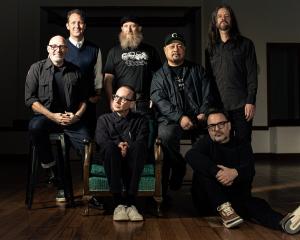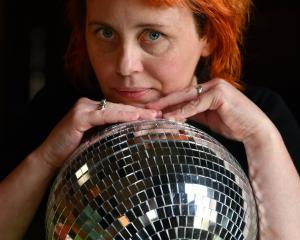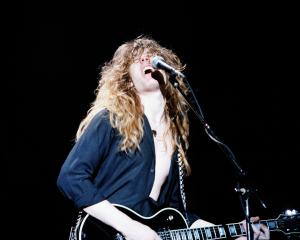Leaving their guitars behind to instead be accompanied by a 64-piece orchestra has the Modern Maori Quartet excited about the possibilities. Rebecca Fox finds out how the collaboration has come together.
Mixing a Maori show band that likes to perform off-the-cuff with the structure of a national symphony orchestra could be a challenge. However, the Modern Maori Quartet and the New Zealand Symphony Orchestra believe they are up to that challenge.
It has required adjustments on both sides - a script for the quartet and allowing some participation with the audience by the NZSO.
''We don't want to make fools of ourselves, so we've come to the project with a bit of discipline,'' quartet artistic director Matu Ngaropo said.
Whatever the adjustments, both parties are excited about their New Zealand tour and what the collaboration will bring.
''It's going to be a very special. A landmark show in the history of New Zealand music,'' quartet member James Tito says.
The concerts will feature new arrangements of show band classics and pop hits including Haere Mai and Pakanga, singalong favourite Ten Guitars and '70s R&B hit Float On.
An ''Aroha Medley'' in the show has the quartet singing several classic pop hits, including I Don't Want to Talk About It (best known version by Rod Stewart) and I Want to Know What Love Is (Foreigner).
The quartet has also written new songs which will be performed with arrangements by seven New Zealand composers - Chris Gendall (University of Otago Mozart Fellow), Mahuia Bridgman-Cooper, Anonymouz, Claire Cowan, Mark Dennison, Robbie Ellis and frequent NZSO collaborator Gareth Farr.
It is a major milestone for the quartet - James Tito, Maaka Pohatu, Matariki Whatarau and Francis Kora - which has been together since 2012.
‘‘It’s pretty awesome to know we have not reached the summit but are still steadily climbing. The work with the NZSO is a testament to that,’’ Whatarau says.
The feat is made more special given that the group only got together after meeting at Toi Whakarri New Zealand Drama School.
‘‘It was a way to support ourselves between acting jobs. Now it’s our main source of income, although we are all still very active as actors,’’ Ngaropo said.
The members all come from musical families, so forming a band was not too out there.
‘‘It’s been interesting to take our acting training and combine that with singing and musicianship.’’
Their idea is to pay tribute to the great Maori show bands of the past, such as the Howard Morrison Quartet, as well as the garage parties they attended growing up.
‘‘It’s just the real flash version with us in suits.’’
They really enjoyed putting on suits for their performances.
‘‘It’s like a suit of armour - like a superhero costume.’’
It is fun to ‘‘croon’’ to people, to be ‘‘larger than life’’ and put on a show that is positive.
‘‘We want to be a source of joy and happiness, full of love.’’
The tour with the NZSO will allow both parties to reach audiences they would not usually reach, although the Modern Maori Quartet had played with smaller orchestras in the past.
‘‘It’s a vastly different world to the NZSO.’’
As part of the tour, they will play in Gisborne, a town the quartet has not played before.
‘‘It’s so great the orchestra is helping us achieve one of our goals. It’ll be special for us as a couple of us have tribal links to the East Coast. And Rotorua, we’ve never done that before, and that is the hub of it all, the [home of the] show bands of the ’60s and ’70s.
‘‘It’ll be lovely to see what those audiences think of how we are carrying on the legacy of the Maori Volcanoes or the Howard Morrison Quartet - they paved the way for us to do what we do.’’
While the NZSO usually played in large venues with international musicians, the quartet usually played in more intimate venues.
‘‘It’s great they want to share that with us,’’ Ngaropo said.
The quartet usually peppers their shows with bantering and off-the-cuff comments, which they have had to script this time round to work with the orchestra.
It is also a great opportunity to create music and re-work some of the classics.
‘‘The orchestra has that level of virtuosity, so it will be interesting to see the marriage of both, ’’ Pohatu said.
NZSO associate conductor Hamish McKeich has been charged with bringing the groups together.
His role is to bring the two genres together and make it work.
‘‘It’s a relatively new mix. New for the orchestra, new for the quartet.’’
For the quartet, that meant concentrating more on their acting and singing and less on the music, leaving that to the NZSO.
‘‘I think it’ll be quite infectious for the audience. The quartet won’t have to worry about the 64-piece orchestra.’’
He and the quartet had rehearsed together for a few days before they travelled to Wellington to rehearse with the orchestra before the tour started.
McKeich has been involved in may cross-over projects in the past, here and in Europe and Australia.
‘‘It can contain pitfalls, but if you facilitate between the two groups you can get an extra good product.’’
Both groups were looking forward to playing in front of new audiences.
‘‘It’s fun to make these things work.’’
McKeich, who started his career as a bassoonist, said he enjoyed conducting as it gave him a greater say in the way music unfolded as it was being played.
His new role as assistant conductor of the NZSO is a ‘‘full-on job’’ with a lot of leadership and responsibility, he said.
‘‘I’m very lucky, its a privilege.’’
To see
Summer Pops with the Modern Maori Quartet, Dunedin Town Hall, Marcn 2















